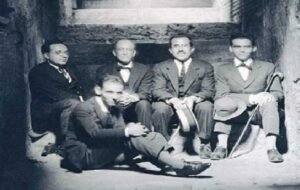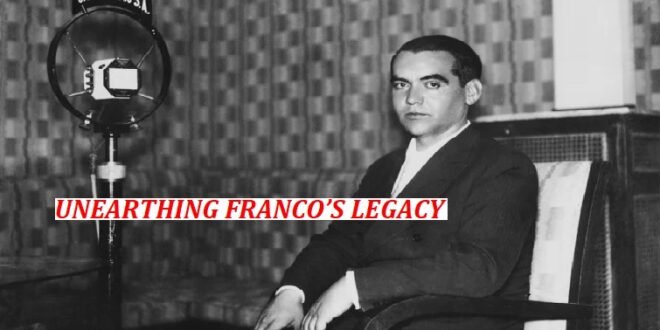22-11-2025
MADRID: In a lecture he delivered in Buenos Aires in 1933, Federico Garcia Lorca, Spain’s most celebrated poet and playwright, observed that “a dead man in Spain is more alive when dead than anywhere else in the world; his profile hurts like a razor’s edge.” Although the remark was made somewhat flippantly, it carries more irony today than Lorca could ever have imagined. More than thirty thousand people, including Lorca, fell victim to Francoist political executions. Seventy-two years later, their bodies, unlike Lorca’s own, have been exhumed from the numerous mass graves into which they were dumped all over the country.
 When Manuel Fraga Iribarne was minister of tourism and propaganda in the 1960s, he coined the well-known and cheerful slogan “Spain is different!” to attract foreigners to the sun and beaches of a country still scarred by its Civil War and under the reign of Franco’s authoritarian regime. The benevolent image promoted by the government was immensely successful in masking the socio political reality of Spanish life, but in light of the evidence that has emerged in the last few decades, a much more accurate description of the country would have been “Spain is one big prison.”
When Manuel Fraga Iribarne was minister of tourism and propaganda in the 1960s, he coined the well-known and cheerful slogan “Spain is different!” to attract foreigners to the sun and beaches of a country still scarred by its Civil War and under the reign of Franco’s authoritarian regime. The benevolent image promoted by the government was immensely successful in masking the socio political reality of Spanish life, but in light of the evidence that has emerged in the last few decades, a much more accurate description of the country would have been “Spain is one big prison.”
In the first third of the twentieth century, Spain’s agrarian oligarchy, in an unequal partnership with the industrial and financial bourgeoisie, was menaced by a militant industrial and rural proletariat. In August 1917, the Left’s feeble revolutionary threat was bloodily smothered by the army. Thereafter, until 1923, when the army intervened again, social ferment occasionally bordered on undeclared civil war. In the south, there were the rural uprisings of the “three Bolshevik years.”
The great historian Pierre Vilar concluded his closing remarks at a colloquium about the French and Spanish civil wars by saying: “We should remember that history consists of what some would like to forget and of what others cannot forget. The historian’s job is to figure out the reasons why some try not to remember and why others cannot help but remember” (Vilar). In 1986, the Spanish bishops declared, “Students of history and society have to help us to know the entire truth about the events leading up to the Civil War, its causes, its battles, and its consequences.
 The war ended April 1, 1939. With it ended not only the class struggle and political contests but also the secular Republic and revolutionary atheism; these demons were exorcised from the body politic by Franco, who claimed divine protection for his victorious army. Spain would begin a new era, which would be marked by its purity, free from the “corruption” of political pluralism, liberalism, and foreign philosophies, not to mention the “Reds,” all of whom would be disarmed and captured.
The war ended April 1, 1939. With it ended not only the class struggle and political contests but also the secular Republic and revolutionary atheism; these demons were exorcised from the body politic by Franco, who claimed divine protection for his victorious army. Spain would begin a new era, which would be marked by its purity, free from the “corruption” of political pluralism, liberalism, and foreign philosophies, not to mention the “Reds,” all of whom would be disarmed and captured.
It is possible to speak of a “crisis of memory” in contemporary Spain, although the term is not used here to suggest a fundamental breach of state legitimacy. The democratic principles of the Transition to democracy, symbolized in the 1978 Constitution, are almost unanimously seen as fundamental and legitimate (Edles). A decisive turning point appears to have been reached, however, in formulating or renegotiating a shared sense of the past in Spain. There remains a problem with the post-Franco transitional settlement. Although not systemic, the current situation revolves around aspects of community life.
In her essay in this section, Jo Labanyi points to a curious contradiction in the recent attention to the pacto de olvido regarding the Civil War and Francoist past that occurred during the Spanish Transition to democracy. This pact of silence or oblivion has been constructed as “fact” precisely through the process of denouncing it. Frequent references to the pacto de olvido in the last six years have somewhat paradoxically transformed its secret or forgotten nature. (Int’l Monitoring Desk)
 Pressmediaofindia
Pressmediaofindia




